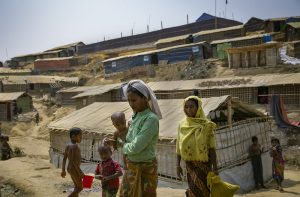A harrowing scenario is currently playing itself out in Aceh, Indonesia, marked by political manipulation and a burgeoning humanitarian crisis. Recently arrived Rohingya refugees, a group plagued by relentless persecution and statelessness, have found themselves at the epicenter of a socio-political storm that transcends borders. The tensions reached a peak on December 27, when hundreds of university students went further, storming a temporary shelter for Rohingya refugees in a convention center in Aceh’s capital, Banda Aceh.
This event in Aceh, spearheaded by student activists with close links to local politicians, is emblematic of a worrying global trend in which the political right-wing cunningly exploits societal vulnerabilities for political gain.
The Rohingya, a mostly Muslim ethnic group from western Myanmar, have long faced oppression in their homeland, highlighted by a vicious assault Myanmar’s military in 2017. The United Nations has described that offensive as a “textbook example of ethnic cleansing.” After being driven out of their own country and into large refugee camps in Bangladesh, many have attempted to seek refuge in various other countries, including Indonesia, with many landing in Aceh, in the country’s far west.
With its history of conflict and a nuanced understanding of displacement, Aceh initially extended a degree of empathy toward these stateless individuals. But this year, which has seen unusual numbers of Rohingya arrive by sea, the narrative has rapidly shifted as certain political elements have seen an opportunity to manipulate public sentiment.
Central to the narrative shift in Aceh is Warija Arismunandar a student at STAI Al-Washliyah Banda Aceh, who has risen to prominence as the coordinator of recent student protests against the presence of the Rohingya, including the forceful expulsion of the refugees from their shelters on December 27. Warija’s involvement goes beyond mere coordination, reflecting a deeper entanglement with local political figures.
Warija is the coordinator and a key member of the Barisan Muda Hadi Surya (BMHS), student group aligned closely with the politician Hadi Surya, the chairman of Gerindra Party for South Aceh. Hadi Surya is standing as a candidate for the Aceh House of Representatives at next month’s national election, in Aceh Constituency 9. This connection indicates a deliberate effort to stir xenophobic sentiments for political leverage. Such a strategy exemplifies the tactics of right-wing populism, which seeks to vilify a chosen out-group, like the Rohingya refugees, in order to galvanize support and divert focus from deeper systemic problems.
Aceh’s economic landscape, marked by challenges such as limited development opportunities and high unemployment rates, makes it a fertile breeding ground for this brand of xenophobia. The economic despair felt by many in the region is palpable and leads to a search for scapegoats in the absence of constructive solutions. In this scenario, the Rohingya, already marginalized and vulnerable, are easy targets. Warija and his political affiliates seem to have tapped into this vein of economic discontent, framing the refugees as a threat to Aceh’s economy and cultural fabric. Such narratives are dangerously simplistic yet effective, diverting the public’s attention from the root causes of their economic woes and directing it toward vulnerable populations.
The implications of such manipulative politics are far-reaching. In Aceh, they set a dangerous precedent whereby right-wing elements exploit economic and social vulnerabilities to incite hatred and violence. This tactic is not unique to Indonesia; it echoes a global pattern where marginalized groups are routinely demonized and blamed for a nation’s problems. But the local impact is twofold: it exacerbates the suffering and marginalization of the Rohingya refugees and simultaneously poses a grave threat to the democratic values and human rights commitments of Indonesia as a whole.
The situation in Aceh, Indonesia, is a stark reminder of the complex interplay between national politics and global humanitarian crises. This scenario reveals the urgent need for a concerted effort from the international community to not only address the immediate humanitarian needs of the Rohingya but also to counteract the rise of xenophobic and populist politics.
This situation also raises serious concerns about the Indonesian political landscape, particularly as the country approaches its national election on February 14. The exploitation of the Rohingya refugee crisis for political gain reflects a disturbing trend in Indonesian politics, where electoral success is increasingly sought through the manipulation of humanitarian crises. The response of Indonesian society to these manipulative tactics will be crucial in determining the future trajectory of the country’s democracy.
The narrative employed by figures like Warija, where refugees are portrayed as threats or burdens, is a dangerous simplification that ignores the complexities of global migration and the fundamental rights of displaced individuals. This narrative, while politically expedient, contributes to a climate of hostility and fear, further marginalizing already vulnerable groups and eroding the principles of compassion and empathy in public policy.
Furthermore, this crisis underscores the importance of robust international mechanisms and cooperation in addressing refugee crises. The plight of the Rohingya in Aceh is a stark reminder that no country can manage such challenges in isolation. It calls for a reinforced commitment from the international community to uphold the principles of asylum and protection for those fleeing persecution and violence. International organizations, governments, and civil societies must work together to provide sustainable solutions for refugees while also addressing the root causes of displacement, such as conflict, persecution, and poverty.
This collaborative approach should also focus on countering the misinformation and hate speech that fuel xenophobic sentiments and policies. Education and public awareness campaigns are crucial in challenging the narratives that dehumanize refugees and justify their mistreatment. Ultimately, the response to the crisis in Aceh and similar situations worldwide must be grounded in a commitment to human dignity, international law, and the shared responsibility to protect and support the most vulnerable among us.

































